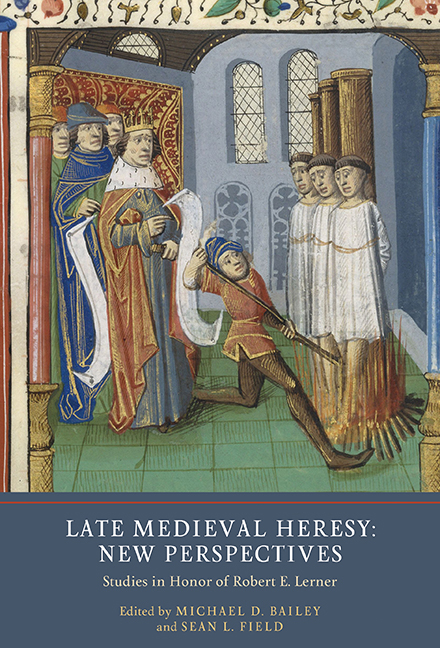Book contents
- Frontmatter
- Contents
- Preface: Robert E. Lerner: A Portrait
- List of Contributors
- Introduction: Historiography, Methodology, and Manuscripts: Robert E. Lerner and the Study of Late Medieval Heresy
- 1 The Heresy of the Templars and the Dream of a French Inquisition
- 2 The Dissemination of Barthélemy Sicard's Postilla super Danielem
- 3 Magic, Mysticism, and Heresy in the Early Fourteenth Century
- 4 The Making of a Heretic: Pope John XXII's Campaign against Louis of Bavaria
- 5 Unusual Choices: The Unique Heresy of Limoux Negre
- 6 Princely Poverty: Louis of Durazzo, Dynastic Politics, and Heresy in Fourteenth-Century Naples
- 7 Disentangling Heretics, Jews, and Muslims: Imagining Infidels in Late Medieval Pastoral Manuals
- 8 New Frontiers in the Late Medieval Reception of a Heretical Text: The Implications of Two New Latin Copies of Marguerite Porete's Mirror of Simple Souls
- 9 Disputing Prophetic Thought: The 1466 Questio quodlibetalis of Johannes of Dorsten
- 10 Heretics, Allies, Exemplary Christians: Latin Views of Ethiopian Orthodox in the Late Middle Ages
- 11 ‘By them in reality I meant the Jews’: Medieval Heretics in the Work and Life of Renate Riemeck (1920–2003)
- Afterword: Who or What Was a Heretic in the Late Middle Ages?
- Robert E. Lerner: A Chronological Bibliography
- Index
- York Medieval Press: Publications
8 - New Frontiers in the Late Medieval Reception of a Heretical Text: The Implications of Two New Latin Copies of Marguerite Porete's Mirror of Simple Souls
Published online by Cambridge University Press: 14 June 2019
- Frontmatter
- Contents
- Preface: Robert E. Lerner: A Portrait
- List of Contributors
- Introduction: Historiography, Methodology, and Manuscripts: Robert E. Lerner and the Study of Late Medieval Heresy
- 1 The Heresy of the Templars and the Dream of a French Inquisition
- 2 The Dissemination of Barthélemy Sicard's Postilla super Danielem
- 3 Magic, Mysticism, and Heresy in the Early Fourteenth Century
- 4 The Making of a Heretic: Pope John XXII's Campaign against Louis of Bavaria
- 5 Unusual Choices: The Unique Heresy of Limoux Negre
- 6 Princely Poverty: Louis of Durazzo, Dynastic Politics, and Heresy in Fourteenth-Century Naples
- 7 Disentangling Heretics, Jews, and Muslims: Imagining Infidels in Late Medieval Pastoral Manuals
- 8 New Frontiers in the Late Medieval Reception of a Heretical Text: The Implications of Two New Latin Copies of Marguerite Porete's Mirror of Simple Souls
- 9 Disputing Prophetic Thought: The 1466 Questio quodlibetalis of Johannes of Dorsten
- 10 Heretics, Allies, Exemplary Christians: Latin Views of Ethiopian Orthodox in the Late Middle Ages
- 11 ‘By them in reality I meant the Jews’: Medieval Heretics in the Work and Life of Renate Riemeck (1920–2003)
- Afterword: Who or What Was a Heretic in the Late Middle Ages?
- Robert E. Lerner: A Chronological Bibliography
- Index
- York Medieval Press: Publications
Summary
The Mirror of Simple Souls, one of the most important mystical treatises of the late Middle Ages, was also one of the most resilient. Written in Old French by a laywoman, Marguerite Porete, at the end of the thirteenth century, it was condemned as heretical twice shortly after it was written: first in Valenciennes sometime between 1297 and 1305, and again in Paris in 1310, when its author was also condemned and burned at the stake. Yet the Mirror escaped destruction and continued to circulate anonymously, surviving not only in French but also in English, Latin, and Italian translations.
In the conclusion to his 2010 article ‘New Light on the Mirror of Simple Souls’, Robert E. Lerner, commenting on this resilience, posited that rather than being relatively thin, the Mirror of Simple Souls's late medieval circulation was instead quite robust. Tallying up the surviving French, Middle English, Latin, and Italian manuscripts, and noting evidence for several other now-lost copies, he observed in his closing sentence that ‘it appears as if dozens of copies of the Mirror were bobbing up continually in the seas of late medieval western Europe like unsinkable corks’.
This remark remains entirely on point. Evidence for further copies drifting around Europe in the fifteenth century has continued to appear in the years since Lerner's article. But while plenty of rumors of these Mirrors’ existence have been found, one thing which has remained elusive for over thirty years is a new, full manuscript copy of the Mirror, in any of its linguistic versions. A few fragments and excerpts from lost Mirrors have surfaced here and there, but new full copies have long been absent.
This long drought has now broken, however. Proving once again the aptness of Lerner's observation, not one but two new corks have bobbed to the surface in the Latin manuscript tradition of the Mirror (Speculum simplicium animarum), offering crucial new insights into the Mirror's fortunes in the ‘seas’ of late medieval Europe.
- Type
- Chapter
- Information
- Late Medieval Heresy: New PerspectivesStudies in Honor of Robert E. Lerner, pp. 157 - 177Publisher: Boydell & BrewerPrint publication year: 2018



